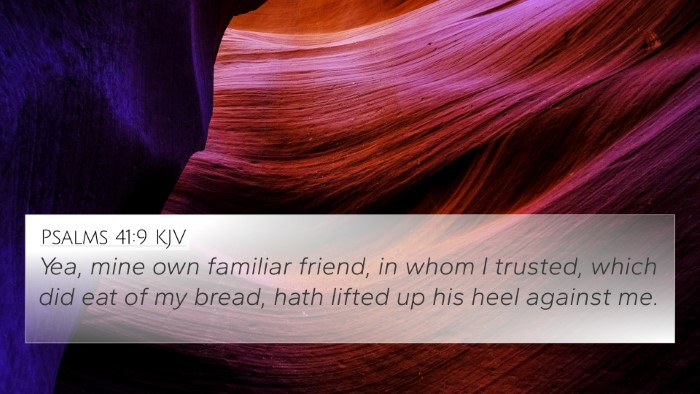Understanding Luke 22:21
Verse: Luke 22:21 - "But behold, the hand of my betrayer is with me on the table."
This poignant moment in Luke 22:21 occurs during the Last Supper, where Jesus shares a final meal with His disciples. This verse is rich with meaning, particularly as it anticipates the betrayal by Judas Iscariot, setting a profound tone for the events that follow.
Contextual Overview
The context of this verse is crucial for understanding its implications. In the lead-up to His crucifixion, Jesus acknowledges the imminent betrayal, signaling not only the rejection of His messiahship but also the fulfillment of Old Testament prophecies.
Insights from Public Domain Commentaries
- Matthew Henry: He emphasizes the gravity of the moment, noting that Jesus had already identified His betrayer before the act of betrayal takes place. This shows Christ's sovereignty over the unfolding plans of salvation and illustrates the depths of human treachery.
- Albert Barnes: Barnes highlights the significance of sharing a meal, which in Jewish culture represents fellowship and trust. The act of betrayal occurring in such a sacred setting reflects the depths of Judas's betrayal.
- Adam Clarke: Clarke points out how this declaration by Jesus creates a moment of tension and reflection among the disciples, prompting them to consider their own fidelity to Him, thus introducing themes of loyalty and betrayal that permeate the narrative.
Key Themes
This verse encapsulates several significant themes:
- Betrayal: Judas Iscariot's act of betrayal highlights the tension between divine foreknowledge and human action.
- Innocence and Suffering: The innocence of Jesus in contrast to Judas's betrayal underscores the suffering that Jesus is about to endure.
- Sovereignty of God: Jesus's awareness of the betrayal showcases God's sovereignty throughout the Passion narrative.
Cross-Referencing Biblical Texts
Luke 22:21 can be cross-referenced with several relevant scriptures that enhance the understanding of betrayal, sovereignty, and the Last Supper's significance:
- Matthew 26:14-16: This passage elaborates on Judas's arrangement to betray Jesus for thirty pieces of silver, illustrating motivations behind betrayal.
- John 13:21-30: Here, Jesus explicitly mentions His betrayer at the table, and Judas is revealed as the one who betrays Him.
- Psalm 41:9: This Old Testament prophecy foretells the betrayal of a close friend, directly connecting to the actions of Judas.
- Zechariah 11:12-13: This scripture discusses the thirty pieces of silver which were given for the betrayal of the shepherd, prophecy fulfilled by Judas.
- Isaiah 53:3: While not directly referencing betrayal, this verse conveys the suffering servant theme, indicating the rejection Jesus would face.
- Luke 22:19-20: These verses prior to 22:21 detail the institution of the Lord’s Supper, which is intertwined with the theme of sacrifice and atonement.
- Acts 1:16-20: This New Testament passage refers to the fulfillment of scripture regarding Judas's betrayal and the consequence thereof, linking to the importance of accountability.
Connecting Themes with Other Bible Verses
The motifs in Luke 22:21 find echoes in various parts of Scripture, demonstrating thematic connections across both Old and New Testaments:
- How do betrayal and trust interact in Proverbs 25:9-10?
- What can 1 Corinthians 11:23-26's teaching about the Lord’s Supper reveal about the meaning of commitment?
- John 17:12 reflects Jesus's view on the necessity of protecting His followers, highlighting the weight of betrayal.
- The themes of 'fellowship' and 'betrayal' can also be seen in Galatians 2:9, concerning partnership in ministry.
Conclusion
Luke 22:21 serves as a potent reminder of the humanity and frailty of those closest to Jesus. It underscores the complex interplay of divine foresight, human betrayal, and the deep significance of shared meals in biblical tradition. In studying this verse, we see the depth of Christ's love and the reality of His impending sacrifice, inviting us to reflect on our commitments and relationships.
Further Study Using Cross-References
Engage in Bible cross-reference studies to deepen your understanding of betrayal, love, and reconciliation in the context of Scripture. Consider employing tools like a Bible concordance or a cross-reference Bible study guide. These resources enable exploration of intricate connections between Bible verses and provide comprehensive insights.










